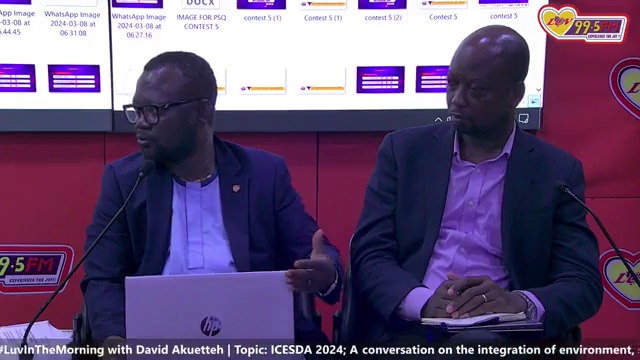Executive Director for the Centre for Business Incubation, Dr Christian Sewordor Mensah, has observed a low enthusiasm in Ghana’s quest to militate against actions that degrade the environment, bringing about a climate crisis.
According to him, the country’s failure to take drastic measures to achieve the 17 Sustainable Development Goals by 2030 could plunge the economy into food insecurity.
Speaking on Luv FM, Dr Mensah emphasised that collective focus and consideration are needed to take proactive measures for environmental progress.
"If we don't take bold and intentional steps to confront the issues that have been identified and categorised as global challenges, we will soon find ourselves without any food to eat due to the adverse effects of the environment," he said.
He observed environmental challenges, such as illegal mining and destruction of wetlands, pose threats to human existence.
“The society could be drained and ultimately face extinction and encounter challenges that can't be quickly resolved, potentially leading to our demise,” he said.
Dr Mensah made the submission ahead of a three-day international conference that would gather stakeholders in academia and industry to delve into pressing matters about the environment and sustainable development in Africa.
The event dubbed ICESDA2024 is on the theme, “Enhancing Environment, Social, Governance and Sustainability for Africa’s Development.”
The maiden edition would see deliberations and recommended solutions to address environmental and climate challenges in Ghana and on the African continent.
Professor De-graft Owusu Manu of the KNUST says the country's attitude and perception in finding pragmatic solutions to tackle environment and climate destruction are not good enough.
“The recent Akosombo water spillage and the illegal mining menace is affecting us badly. We need solutions to solve these problems. If we don’t take action. There’s going to be problems for our future,” he said.
Advocating for a more robust system to fight the climate menace, the Conference Manager for ICESDA2024, Dr Appiah Kenneth, acknowledged that despite the existence of sanitation and environmental laws, their implementations are faced with setbacks.
“There are laws regarding sanitation, but the real issue lies in the enforcement. Enforcing these regulations requires adequate resources because it is not as simple as just implementing laws. We need to provide the necessary resources to empower those responsible for enforcing such laws,” he said.
Latest Stories
-
I want to focus more on my education – Chidimma Adetshina quits pageantry
3 hours -
Priest replaced after Sabrina Carpenter shoots music video in his church
3 hours -
Duct-taped banana artwork sells for $6.2m in NYC
3 hours -
Arrest warrants issued for Netanyahu, Gallant and Hamas commander over alleged war crimes
3 hours -
Actors Jonathan Majors and Meagan Good are engaged
3 hours -
Expired rice saga: A ‘best before date’ can be extended – Food and Agriculture Engineer
4 hours -
Why I rejected Range Rover gift from a man – Tiwa Savage
4 hours -
KNUST Engineering College honours Telecel Ghana CEO at Alumni Excellence Awards
4 hours -
Postecoglou backs Bentancur appeal after ‘mistake’
4 hours -
#Manifesto debate: NDC to enact and pass National Climate Law – Prof Klutse
4 hours -
‘Everything a manager could wish for’ – Guardiola signs new deal
5 hours -
TEWU suspends strike after NLC directive, urges swift resolution of grievances
5 hours -
Netflix debuts Grain Media’s explosive film
5 hours -
‘Expired’ rice scandal: FDA is complicit; top officials must be fired – Ablakwa
6 hours -
#TheManifestoDebate: We’ll provide potable water, expand water distribution network – NDC
6 hours

